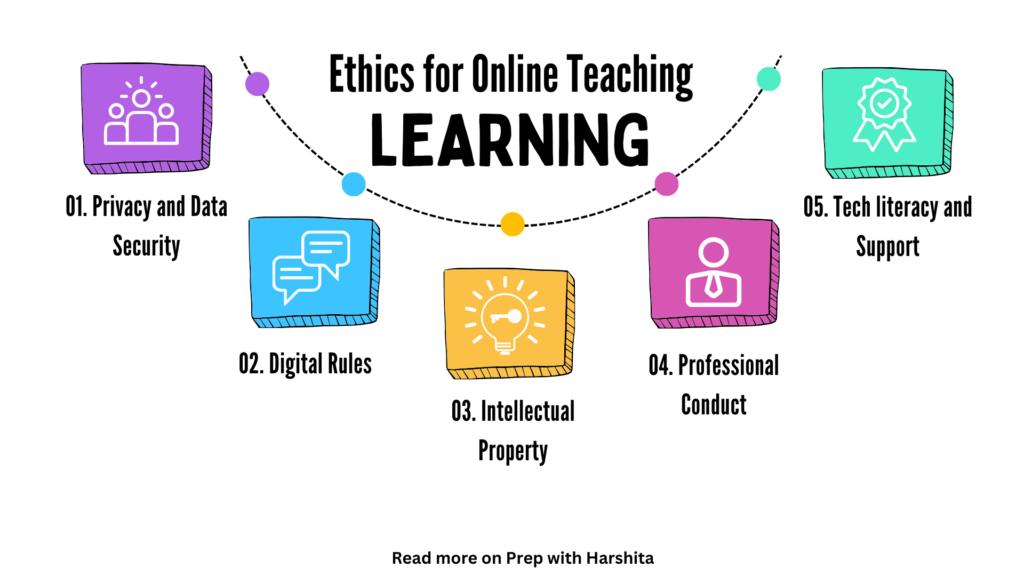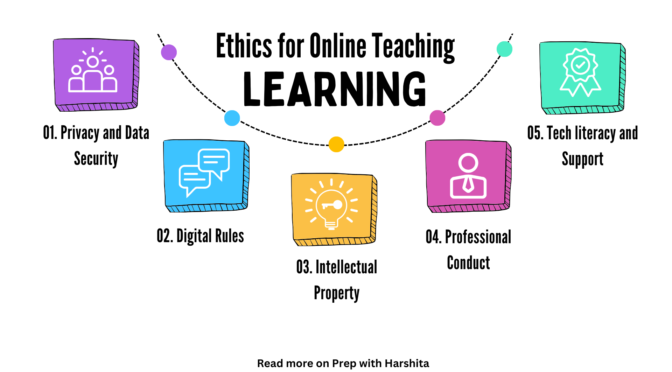Online teaching and learning come with their own set of ethics. As technology continues to play an important role in education, it’s essential to follow and adhere to ethical guidelines to ensure a positive and fair learning environment for all participants. Here are some key ethical considerations for online teaching and learning:
Privacy and Data Security:
- Respect and protect the privacy of students. Be transparent about the data you collect and how it will be used.
- Ensure that online platforms used for teaching comply with data protection laws and maintain data security.
Digital rules:
- Promote responsible and ethical behavior online. Teach students about digital rules, including issues related to online etiquette, cyberbullying, and plagiarism.
- Encourage a positive online culture where students treat each other with respect and engage in constructive discussions.
Accessibility:
- Design courses and materials with accessibility in mind, ensuring that all students, regardless of their abilities, can access and benefit from the content.
- Provide alternative formats for materials, and captions for videos, and to make sure that online platforms are accessible to all individuals.
Intellectual Property:
- Respect copyright laws and intellectual property rights. Use only materials for which you have the right permissions, and educate students about proper citation and attribution.
- Encourage students to create and share original work, respecting the intellectual property of others.
Professional Conduct:
- Maintain professionalism in all online interactions with students, colleagues, and parents. Avoid engaging in inappropriate or offensive behavior.
- Set clear boundaries and expectations for communication, and ensure that communication channels are used for educational purposes.
Informed Consent:
- Obtain informed consent when using technologies that involve recording or monitoring students. Inform them about the purpose and scope of data collection.
Tech Literacy and Support:
- Provide adequate technical support for students who may face challenges with the online learning environment.
- Ensure that students have the necessary digital literacy skills to navigate online platforms and tools effectively.
Also Visit: Prep with Harshita



https://microsoft-powerpoint-2010.softonic.kr/download
https://nicesongtoyou.com/job/busan-deagu-inchon/
하동동해출장만남 소자본 창업
강남섹스안마조건만남
https://www.youtube.com/@GILMONG201
https://new-software.download/windows/kakaostory/
https://www.youtube.com/channel/UCeVNIN2PoYFRDmFyYRmK7bQ
https://mintfin.tistory.com/tag/홍콩20송환법이란20무엇이며20홍콩20시위20이유20정리
https://edithvolo.com/page/182/
https://www.youtube.com/@TV신호등
https://new-software.download/windows/blitz-gg/
https://www.youtube.com/channel/UCe0Qrv4HvRK_iup3X_cNdBA
https://www.youtube.com/@TV신호등
https://www.youngstarmedia.com/
수원출장샵
https://www.youtube.com/@소중한인연-c1u
벼룩시장 구인구직 및 신문 그대로 보기 (PC/모바일) | 구인구직 앱 어플 무료 설치 다운로드 | 모바일 벼룩시장 보는 방법 | 벼룩시장 부동산 | 지역별 벼룩시장 | 벼룩시장 종이신문 에 대해 알아보겠습니다. 섹스카지노사이트
https://www.youtube.com/channel/UCyt2dGrKTf9KpBk1jdUl3oA
https://www.youtube.com/channel/UCyt2dGrKTf9KpBk1jdUl3oA
https://www.youtube.com/channel/UCeVNIN2PoYFRDmFyYRmK7bQ
https://www.youtube.com/@가요여행
https://www.youtube.com/channel/UCeVNIN2PoYFRDmFyYRmK7bQ
https://www.youtube.com/channel/UCyt2dGrKTf9KpBk1jdUl3oA
https://www.youtube.com/@가요여행
https://www.youtube.com/@소중한인연-c1u
https://www.youtube.com/channel/UCe0Qrv4HvRK_iup3X_cNdBA
https://www.youtube.com/@영스타미디어
https://www.youtube.com/channel/UCJLXoLNzHeK70WCJlQNYf-g
https://kleonet.com/
https://www.youtube.com/@DaftTaengk
https://www.youtube.com/channel/UCyxM_MlJsJQaQSuJ8lR58tg